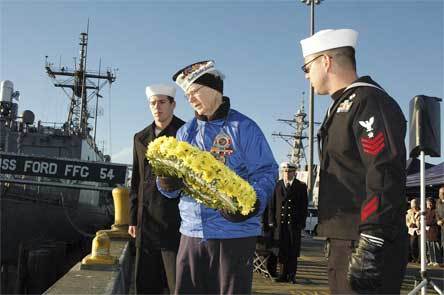Both those who served and those who have known them took time Dec. 7 to honor the memories of America’s veterans during the 68th anniversary of the Japanese attack on Pearl Harbor.
USS Ford hosted a Pearl Harbor remembrance ceremony at Naval Station Everett, while the Stillaguamish Valley Pioneer Hall and Museum conducted its annual “Military Day,” which has always coincided with the anniversary of Pearl Harbor.
Ed Kirchgessner poured himself a cup of hot coffee before braving the cold outside USS Ford. He began his 20-year Navy career in 1939, and was serving as a torpedoman on board USS Craven when the attack took place.
“We were on our way back to Pearl Harbor,” Kirchgessner said. “If we hadn’t stopped to refuel at Wake Island, we would have been there when the attack took place. By the time we got back, only the keel of USS Oklahoma was showing and the bow of USS Shaw had been blown off.”
Kirchgessner looks forward to the annual remembrances for reuniting him with fellow veterans from that era.
“There’s always a couple of us that show up and lie to each other,” he laughed. “The stories get better every year.”
Former USS Maryland crew member Woodrow Soals has passed on, but his daughter Emily was at Naval Station Everett to share his story as an electrician’s mate who saw the first wave of the Pearl Harbor attack when he was on liberty at the Royal Hawaiian Hotel.”
“He high-tailed it to a rowboat to get to his ship,” Emily Soals said. “While he was climbing up the ship’s side, shrapnel missed him by less than a foot. He fell into water that was a yard deep and filled with burning diesel fuel.”
Woodrow Soals’ subsequent Navy career lasted 30 years and included a stint in Vietnam.
“I’m very proud of my dad and I miss him terribly,” Emily Soals said. “The boys who are serving in his stead now are fighting for our freedom.”
Raymond Wans served on board USS Curtiss during the Pearl Harbor attack, during which 20 of his shipmates were killed and 60 were injured. Before he laid a memorial wreath on the water, he reflected on his “unlucky ship.”
Wans credited Nickolas Ganas, a mess cook, with saving his life by relieving him at his gun position, where Ganas was killed. USS Curtiss gun crews shot down three Japanese planes and put a five-inch shell through the conning tower of a midget submarine.
“We lost 12 men from my division alone,” Wans said. “We were all a bunch of kids. I thought that attack lasted all day, but it was only two and a half hours. We were very frightened youngsters, but our boys were tough and handled themselves well.”
While the Stillaguamish Valley Pioneer Hall and Museum “Military Day” is not devoted exclusively to Pearl Harbor, the attack was mentioned by veterans such as Bill Morse, of the Veterans of Foreign Wars Post 1561 in Arlington. Morse shared his memories of visiting USS Arizona in Pearl Harbor and remarked upon the changing face of warfare.
“Pearl Harbor was a premeditated attack by one military against another military,” Morse said. “Since then, we’ve been fighting terrorists who hide behind women and children.”
Tony Scalzo was an Army engineer whose 30 years in the service started in 1943, but never coincided with combat duty during World War II. He made up for it with tours in Korea and Vietnam, where he worked on housing, airports and runways.
“It was as hard as anything, just being over there, but if you have a job to do, you do it right,” Scalzo said of his time in Vietnam, while he visited with fellow vets at the Pioneer Hall. “I’m happy to be back, but I’d be willing to do it again.”
Dick Prouty spent “Military Day” thinking not only about his own service as an Army engineer, but also of his grandson Ben, an Army private currently stationed in Kuwait.
“He says it stinks like rotten fish over there,” laughed Prouty, whose son Jim also served in the Army. “I’m concerned about him going to Iraq. I hope this war is over with fast. It’s time for us to get out of that mess.”
Prouty’s own time in the service left him with a unique memento, which he proudly showed off at the Pioneer Hall. He served in Korea for nine months, during which time he was promoted from second lieutenant to lieutenant, and before he left, he was presented with a tea set engraved with his name and made from surplus artillery shells.
“I’d love to see Korea now,” Prouty said. “It was a beautiful country. Seoul was completely bombed out, until its buildings were just shells, but I hear they’ve done amazing rebuilding. I hope to get back there someday.”







